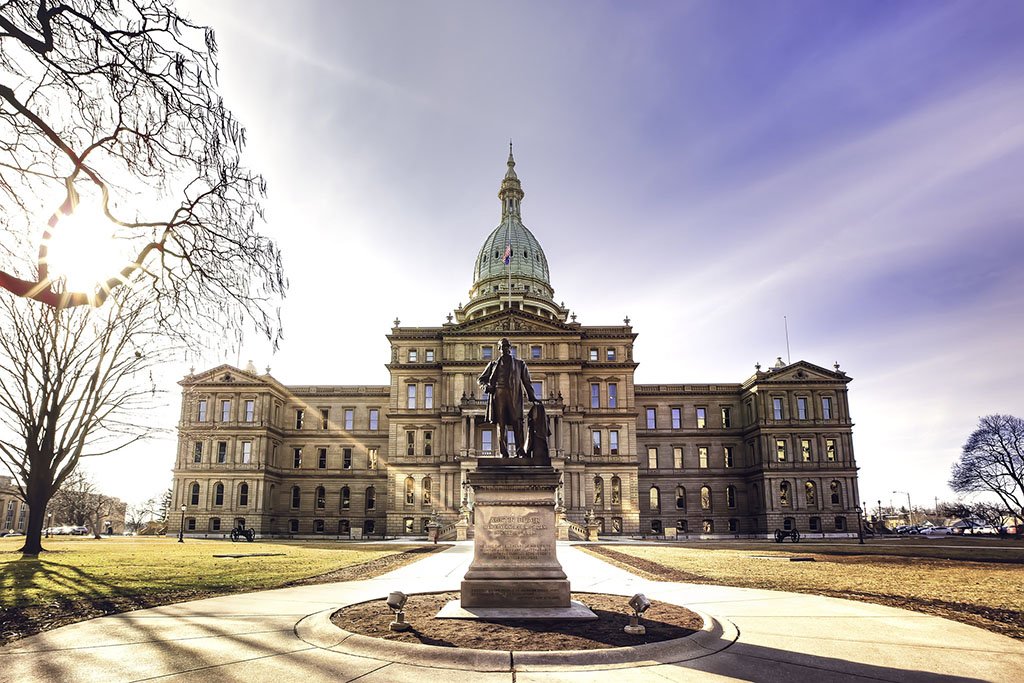Michigan capitol building by Robert Du Bois from Flickr Creative Commons
As lawmakers consider two vital bills, bipartisan voices showed up to support the legislation.
Last Wednesday the Michigan House Energy Committee heard testimony from organizations and citizens across the state in favor of bipartisan legislation to expand community solar energy in the state. Companion House bills 4715 and 4716 — introduced by Rep. Rachel Hood (D-76th District) and Rep. Michele Hoitenga (R-102nd District), respectively — would remove the regulatory red tape preventing community solar projects being developed in Michigan, which currently has some of the highest energy rates in the country.
Calling community solar a “commonsense, bipartisan issue,” Rep. Hoitenga testified that increasing Michiganders energy choice by expanding community solar would allow residents to access the benefits of solar energy while lowering their bills.
“It’s rare to find a truly bipartisan issue,” agreed Rep. Hood, who said, “Energy choice should be accessible and available to everyone in our state as soon as possible.”
Across nearly an hour and a half of testimony, advocacy groups, industry representatives and even students from Michigan Technological University spoke in favor of the two bills. The only two groups to testify against the bill were Michigan’s two largest investor-owned utilities, Consumers Energy and DTE.
“I’ve always dreamed of being able to come back and build community energy in Michigan,” said Liz Reddington, a Great Lakes State native, of Pivot Energy, a community solar developer. “We are here and ready to invest in the state. We’d invest in local landowners, we’d invest by hiring staff and construction workers, and we’d be supporting local schools and governments with our local tax payments.”
The benefits that would be realized at the local level resonated with several speakers at the hearing.
“We’re increasing the tax base for local jurisdictions across the board,” said Scott Risley, development director for Nautilus Solar, another community solar developer. Risley also spoke about the need to build deep relationships with everyone from labor workers to business subscribers to individual customers in order to be successful. When Nautilus has built solar energy systems in other states, he said, it’s been worth the company’s time and investment to partner with the best-qualified local workers at every step of the process. “We’re long-term owners,” he said, “so we want our systems built right.”
Risley testified alongside Laurel Passera, policy director for the Coalition for Community Solar Access, a national trade association representing the community solar industry. She emphasized grid resiliency, bill savings and economic development as overwhelming arguments in favor of community solar. “Instead of relying on large power plants, and the poles and wires to transmit power hundreds of miles, a grid with more distributed, community-scale solar can even out the electric load and reduce outages,” she said, indicating that the typical subscriber saves 10% to 15% on their monthly electric bills. She and others cited a mid-October Michigan State University study that found community solar will create $1.47 billion in economic impact, and the equivalent of 18,500 family-sustaining jobs, over a 30-year period.
Representatives from utilities Consumers Energy and DTE were the only ones at the hearing to vocally oppose the legislation.
Katie Carey of Consumers Energy responded to an inquiry calling the legislation “unnecessary” and a path toward “deregulation.”
But with bill co-sponsors from both sides of the aisle, both liberal and conservative groups lined up to highlight the rare opportunity that this legislation presents.
Ed Rivet, executive director of the Michigan Conservative Energy Forum, rebutted arguments from utility representatives that community solar wasn’t necessary. “There are so many niche places that the community solar industry will bring in and develop that utilities won’t,” Rivet said in an interview after the hearing. “Utilities are not going to go into some of these inner-city locations or small towns and do a 1- or 2- or 5-megawatt project. There’s not an incentive for them to do that.”
“All lawmakers have an interest in keeping rates low for their constituents and ensuring that energy is reliably provided, and that’s primarily why this has such broad, bipartisan appeal,” added Nick Occhipinti, director of government affairs for the Michigan League of Conservation Voters. “After a summer of climate-driven extreme weather that left Michiganders out of power for days, and in some cases weeks, there is growing recognition that Michigan needs to do something different now.”
In the coming weeks, Rivet, Occhipinti and others will continue to work with legislators to schedule the bill for a vote. “We hope [committee chairman Rep. Joe Bellino] is going to schedule the bill again for a hearing and a vote,” said Rivet. “The chairman calls the shots.”
Occhipinti added, “If our leaders show strength and a willingness to move this commonsense policy forward—engaging it earnestly to improve it throughout the process—we’ll have all kinds of kumbaya moments and opportunities to sing their praise. If they continue to kowtow to powerful utilities who lately only know how to say ‘no’ in service of their guaranteed monopoly profits, then we’ll be compelled to communicate that all to the people of Michigan.”
DTE did not respond to our request for comment.




